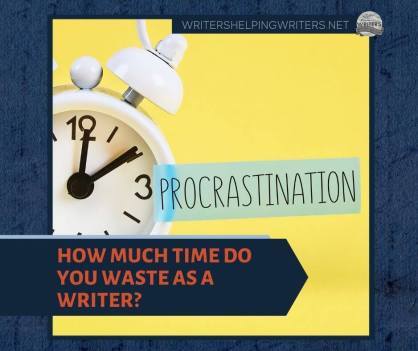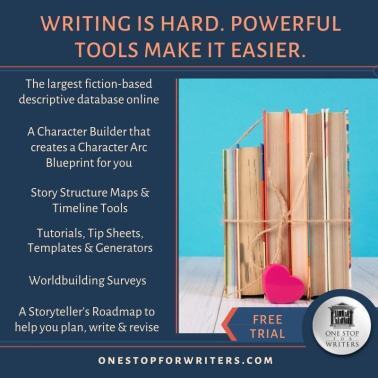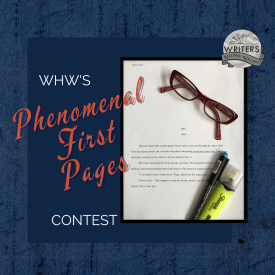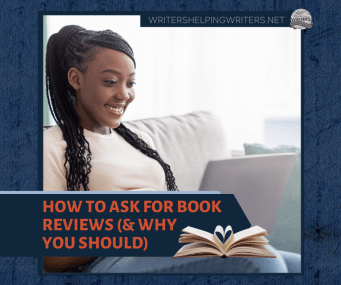Angela Ackerman's Blog: Writers Helping Writers, page 40
March 22, 2023
How Much Time Do You Waste as a Writer?

It’s a touchy topic, I know.
On one hand, we may putter a bit as a way ‘into’ writing–getting supplies together, pouring a cup of coffee, and putting a few cookies on standby. Most of us have a pre-writing ritual. But, on the other hand, after we do those things, how many of us suddenly remember something that needs our attention? Maybe, Oh, I forgot to send that email and so we head to the inbox. We send our message, but as we do, see another about a friend’s new book. So, naturally we zip over to Goodreads and add it to our shelf.
You know where this is going. Goodreads leads to Facebook, which leads to Instagram and Tiktok, and boom, an hour’s gone. Maybe more.
Another thing that chews up writing time is the research and brainstorming we need to do. There’s always things to look into for our story, and information for marketing, learning stronger craft, and more.
Finally, there’s the time we waste trying to locate our story planning materials – those characters bios, timelines, notes about the plot, worldbuilding information, and the rest which helps us as we write and revise. These things may be scattered in notebooks, on hard drives, post-its, etc. and every time we need to look something up, it pulls us out of the writing flow. Sometimes by the time we find it, we’ve lost track of what we had planned to say.
So…how do we get lost time back?By changing our habits & process a touch so writing time is spent doing exactly that: writing. Here are some tweaks that might help you:
Procrastinate…with a timer. If you know it’s your habit to check a few things before you start writing, then give in to it, but set a timer on your phone to limit how long you spend surfing social and handling email.
Schedule time for non-writing tasks. Story planning, researching information to help us write and market, connecting with people on social media, and yes, answering email – it all needs to be done. But if we organize ourselves better, and create designated times for those bits of work, we protect our sit-down-and-write sessions.

Organize our story materials in the same place. It’s true, we can be like birds, storing shiny bits and bobs for our story all over. This happens because as we’re planning, we’re not always in the same place. Sometimes we’re at the computer and things go into a file, other times, ideas hit in the car and we jot down notes on our phone or on the back of a receipt.
Keeping things together means we always know where to go when we need to check something about a character, scan our outline, or remind ourselves of certain story details. Being able to find the information we need quickly is key to getting back to writing and more words each session.
If you’re looking for a way to organize all your story items, check out One Stop for Writers. We just revamped our dashboard, the Workspace. You can create everything for your story there, store it, and when you need to look something up, it auto-sorts everything for you. (Don’t you wish someone would create a button to sort out your actual desk? I do!)
Check it out:
Finally, if you’re procrastinating too often, ask yourself why. Often, we fall into a distraction hole because we’re struggling with the story. When the writing gets hard, our motivation drains away. We’d rather get lost on the internet than face a nasty knot in our manuscript.
Problems don’t fix themselves, so we need to push ourselves to identify what’s wrong, so we can find a solution. Going back to our story materials is often key as they can show us if we’ve planned enough, need to raise the stakes, give a character more depth, add a scene, or something else. TIP: The Storyteller’s Roadmap has a Code Red section to help you fix the most common story problems.
How do you make sure procrastination and disorganization doesn’t derail your writing? I’d love to hear your tips!
The post How Much Time Do You Waste as a Writer? appeared first on WRITERS HELPING WRITERS��.
March 21, 2023
The Importance of a Great Opening in a Novel

How you start your story is super-important, which is why your novel’s opening is crucial. In just a few sentences – yup, sentences, never mind pages! – you need to GRAB your reader’s attention and pull them into your storyworld.
But HOW do writers do this? Well, how long is a piece of string … your novel’s opening may depend on many factors. That’s the bad news though. The good news is there ARE best practices we can learn from. Ready? Let’s go …
WHY a Great Opening is ImportantA great opening in a novel is important for several reasons …
i) It sets the tone for the rest of the book. ‘Starting as you mean to go on’ is very important in novel writing. It won’t do to start a romantic comedy with a murder, for example. Whilst that may seem obvious – and it is – it’s surprising how few writers ‘match’ their genre and tone with their content!
ii) It can also set up the conflict and introduce the reader to the characters. Lots of writers think ‘conflict’ = lots of arguments or fighting. Yet as screenwriters always say, ‘drama is conflict’ which means the SITUATION characters find themselves in. In other words, you just need a strong situation that creates lots of problems for your protagonist. This in turn means we learn about your character from how they respond to those problems.
iii) Lastly, a great opening can hook the reader and make them want to keep reading. If a potential reader is interested in your book, there’s a strong chance they will check out your first page. Few of us buy books without downloading the sample from Kindle, or opening the book in the store. We all make snap judgements!
Think of your novel’s opening as your ‘audition’ for a new reader and you can’t go wrong.The Different Types of Openings
A great opening in a novel is one of those ‘you’ll know it when you see it’ type of things. It could be a powerful prologue that sets the stage for the story to come, or it could be a slow-burn first chapter that gradually builds up to something more exciting. Whatever form it takes, a great opening is always important in hooking readers and keeping them invested in the story.
Tip # 1: Start with Action
One of the most common ways to open a novel is with some kind of action scene. I write crime fiction and thrillers, so I often start with the crime itself … Or I may begin with a person’s response to it (running away, fighting back, racing to cover it up, etc).
However, you can do whatever you like as long as it’s exciting! Perhaps in your horror novel your protagonist is being haunted by ghosts or chased by werewolves? Or in your romantic comedy, perhaps your character is racing after their ex-partner to stop them from leaving?
Action openings are usually fast-paced and exciting, and they can give readers a good sense of what the rest of the novel will be like. They can also be used to introduce readers to the characters and setting of the story right away.
Tip # 2: Focus On Worldbuilding
Another popular way to start a novel is with a focus on worldbuilding. This could involve introducing readers to the rich history and lore of the storyworld. Alternatively, it could simply be establishing the everyday lives of the characters before things start to get interesting.
One word of caution: it can be very easy to ‘info dump’ when worldbuilding if you are not careful! Make sure you don’t make your reader ‘wait’ for the story to start … Introduce the setting, situation and characters hand in hand.
Tip # 3: Start with Characters
Some novels choose to open with character introductions instead, either through dialogue or inner monologue. This often benefits from a quirky beginning that really marks the character out.
One of my favorites is probably I Capture the Castle by Jodie Smith. Protagonist and narrator Cassandra starts with the memorable line, ‘I write this sitting in the kitchen sink’!
More Examples of Great Novel OpeningsMore memorable first lines that focus on the characters …
“Call me Ishmael.” – Herman Melville, Moby Dick“It was a queer, sultry summer, the summer they electrocuted the Rosenbergs, and I didn���t know what I was doing in New York.” – Sylvia Plath, The Bell Jar“It was a bright cold day in April, and the clocks were striking thirteen.” – George Orwell, 1984“Lolita, light of my life, fire of my loins.” – Vladimir Nabakov, Lolita“It was a pleasure to burn.” – Ray Bradbury, Fahrenheit 451Tips on Writing a Great Opening for Your NovelIt’s no secret that the first few pages of a novel are important. They are what hook the reader and make them want to keep reading. But how do you write a great opening? Here are a few tips:
1. Start with action. You want to grab the reader’s attention from the very first sentence. One way to do this is to start in the middle of the action, rather than at the beginning.
2. Introduce your characters quickly. Don’t spend pages and pages describing them; just give enough information so that readers can start forming attachments.
3. Set the scene. Give readers a sense of place and time so they can immerse themselves in the story.
4. Use strong language. Your words should be evocative and paint a picture in the reader’s mind.
5. Hook the reader with a question or mystery. Make them want to know more so they’ll keep reading to find out what happens next.
Last PointsA great opening in a novel is incredibly important and should be taken seriously. It sets the tone for the entire story, and it can make or break a reader���s interest from the start.
An effective opening will have characters that readers can relate to, an engaging plotline, vivid description of setting, and clever dialogue. Put simply ��� craft your opening thoughtfully and carefully for maximum impact.
Good Luck!
The post The Importance of a Great Opening in a Novel appeared first on WRITERS HELPING WRITERS��.
March 18, 2023
Fear Thesaurus Entry: Being Taken Advantage Of
Debilitating fears are a problem for everyone, an unfortunate part of the human experience. Whether they’re a result of learned behavior as a child, are related to a mental health condition, or stem from a past wounding event, these fears influence a character’s behaviors, habits, beliefs, and personality traits. The compulsion to avoid what they fear will drive characters away from certain people, events, and situations and hold them back in life.
In your story, this primary fear (or group of fears) will constantly challenge the goal the character is pursuing, tempting them to retreat, settle, and give up on what they want most. Because this fear must be addressed for them to achieve success, balance, and fulfillment, it plays a pivotal part in both character arc and the overall story.
This thesaurus explores the various fears that might be plaguing your character. Use it to understand and utilize fears to fully develop your characters and steer them through their story arc. Please note that this isn’t a self-diagnosis tool. Fears are common in the real world, and while we may at times share similar tendencies as characters, the entry below is for fiction writing purposes only.
 Fear of Someone Taking Advantage of Them
Fear of Someone Taking Advantage of ThemNotes
A character with this fear may worry about potential situations where they might be taken advantage or exploited. These could be serious crimes, such as sexual abuse and identity theft or a simpler occurrence, like being used by a friend for some larger gain.
What It Looks Like
Questioning people’s motives
Believing that other people can’t be trusted
Highly valuing privacy
Not volunteering information
Being very independent
Living self-sufficiently
Doing extensive research (to avoid scams, find out if someone is reliable, etc.)
Avoiding vulnerable situations, such as walking at night or being alone with someone
Setting boundaries that keep others at a distance
Avoiding situations where the character has been burned in the past, such as dating, shopping online, or sharing their creative work with others
Not trusting certain types of people (politicians, salespeople, women, etc.)
Pulling away when people try to get too close
Seeing exploitation where there is none
Taking careful security measures (locking up documents, changing passwords frequently, giving a false name, etc.)
Demanding payment up front before offering services
Difficulty working with a team
Resisting new technologies or advances that carry an element of risk
Being standoffish with strangers and new acquaintances
The character being reluctant to help someone outside their inner circle who asks for help
Common Internal Struggles
The character worrying about a person’s trustworthiness, then wondering if they’re being paranoid
Second-guessing the motives of others
Living in a constant fear of betrayal
Feeling unnoticed and underappreciated
The character doubting their own judgment (because they’ve been wrong about people before)
The character mentally warring with their body’s fight-flight-or-freeze instincts
Flaws That May Emerge
Abrasive, Antisocial, Callous, Confrontational, Controlling, Cowardly, Cynical, Evasive, Fussy, Martyr, Oversensitive, Paranoid, Stingy, Suspicious, Uncommunicative, Withdrawn
Hindrances and Disruptions to the Character’s Life
Allowing career advancement opportunities to pass them by because the character fears they’ll be taken advantage of in some way
Being unable to develop meaningful relationship outside of a tight inner circle
Being perceived as paranoid, confrontational, and difficult to work with
Frequently making false assumptions about people
Missing out on friendships or romantic relationships because the character is too afraid to be vulnerable
Scenarios That Might Awaken This Fear
Being asked for a favor
Someone testing the character’s boundaries
Being pressured for information, a commitment, or a purchase
Reuniting with someone who has taken advantage of the character in the past
Catching someone in a lie
Being stalked or followed
Situations where vulnerability is expected (therapy, a Bible study, a game of truth or dare, etc.)
A loved one falling victim to a scam
Other Fear Thesaurus entries can be found here.
 Need More Descriptive Help?
Need More Descriptive Help?While this thesaurus is still being developed, the rest of our descriptive collection (16 unique thesauri and growing) is accessible through the One Stop for Writers THESAURUS database.
If you like, swing by and check out the video walkthrough for this site, and then give our Free Trial a spin.
The post Fear Thesaurus Entry: Being Taken Advantage Of appeared first on WRITERS HELPING WRITERS��.
March 15, 2023
Phenomenal First Pages Contest
 Hey, wonderful writerly people! It���s time for our monthly first-page critique contest
Hey, wonderful writerly people! It���s time for our monthly first-page critique contest 
If you���re working on a first page (in any genre except erotica) and would like some objective feedback, please leave a comment. Any comment :). As long as the email address associated with your WordPress account/comment profile is up-to-date, I���ll be able to contact you if your first page is chosen. Just please know that if I���m unable to get in touch with you through that address, you���ll have to forfeit your win.
Two caveats:
 Please be sure your first page (double-spaced in 12-point font) is ready to go so I can critique it before next month���s contest rolls around. If it needs some work and you won���t be able to get it to me right away, let me ask that you plan on entering the next contest, once any necessary tweaking has been taken care of.
Please be sure your first page (double-spaced in 12-point font) is ready to go so I can critique it before next month���s contest rolls around. If it needs some work and you won���t be able to get it to me right away, let me ask that you plan on entering the next contest, once any necessary tweaking has been taken care of.
 This contest only runs for 24 hours, start to finish, so get your comment in there!
This contest only runs for 24 hours, start to finish, so get your comment in there!
Three commenters��� names will be randomly drawn and posted tomorrow morning. If you win, you can email me your first page and I���ll offer my feedback.
We run this contest on a monthly basis, so if you���d like to be notified when the next opportunity comes around, consider subscribing to our blog (see the right-hand sidebar).
Best of luck!
PS: If you want to amp up your first page, grab our helpful First Pages checklist from One Stop for Writers. And for more instruction on these important opening elements, see this Mother Lode of First Page Resources.The post Phenomenal First Pages Contest appeared first on WRITERS HELPING WRITERS��.
March 14, 2023
Character Arcs: Making a Long Story Short

A well-structured story uses events (also called story beats) to move the narrative forward ��� with compelling issues, rising stakes, and an organic sense of cause and effect ��� toward a surprising-yet-inevitable resolution. At the same time, our story���s plot events force our characters to react, adapt, make choices, and decide on priorities, often resulting in new goals and revealing a character���s values and beliefs. The biggest events are ���turning points,��� which send the story in new directions and create the sense of change for a story���s arc.
In other words, story structure affects both plot and character (internal/emotional) arcs. So just as we must adjust the plot aspects of story structure when writing a shorter story, we also need to consider the character arc aspects of story structure with shorter stories. Let���s dig into the ways we might tweak story structure for shorter stories, especially when it comes to character arcs.
Story Structure & Shorter PlotsOn a basic level, we can understand story structure as:
story beginnings introduce characters and story problems,story middles add stakes and depth to both characters and story problems, andstory endings bring issues to a satisfying conclusion.
In addition to those basics, the structure of novel-length stories fleshes out events ��� with inciting incidents, denouements, subplots, pinch points, or other complications ��� to increase the stakes, create more obstacles, explore failed attempts to solve the problems, etc. Those techniques are especially common in the middle of the story to prevent a ���sagging middle.���
Those fleshing-out events like subplots and pinch points are usually the first plot aspects we trim for shorter length stories. Short stories simply don���t have the word count for subplots or other complications.
Character Arcs: What Are Our Options?3 Types of Character ArcsCharacter arcs in Western storytelling are defined by 3 categories:
Positive Arc: (also called a Growth Arc) The character learns and grows, bettering themselves (such as by understanding how their previous choices were self-sabotaging), as part of their journey to overcome the story obstacles.Flat Arc: The character learns how to better the world around them (such as by understanding how they can take action) as part of their journey to overcome the story obstacles (think of many single-protagonist series).Negative Arc: (also called a Failure Arc) The character fails to overcome the story obstacles and reach their desires (such as by becoming disillusioned, corrupted, etc.) and succumbs to their flaw (think of Anakin Skywalker to Darth Vader).Spectrum of Character Arc DepthsEach of those types of arcs can be explored at different depths. For example, in a positive arc, a character can grow and better themselves in a���
simplistic way, such as being willing to trust someone else, or in adeeper way, examining how that emotional journey happens, such as exploring an emotional wound from their backstory that led to them having fears and false beliefs about the world (���trust just leads to being stabbed in the back���), and the character working to overcome their fears and false beliefs to be willingly vulnerable with their trust of another.There���s no ���best��� approach, as different stories might work better with certain types or depths of character arcs, and different genres have different expectations for the emotion level of character arcs. In addition, the length of our story can affect the type and depth of our character���s arc.
Character Arcs, Story Structure, and Story LengthMapping a Simplistic Character Arc onto Story StructureUsing a positive/growth arc as an example, here���s how a simplistic character arc can be mapped onto���and explored within���a story���s structure:
What does the character long for and desire? (story ending)What choices are they making that keep them from their dream? (story beginning)What do they learn? (how they change throughout the middle)What are they willing to do at the end that they weren���t willing to do before? (story climax)Adjusting Story Structure for Deeper ArcsIf our story has the word count and setup for a deeper emotional arc for our character, we could flesh that basic story structure out with:
subplots that reinforce their backstory wound or fears from a different angle,scenes with failed attempts to overcome their fears,plot events that make them retreat into their fears,scenes with the character���s growth/epiphanies tying their arc into the story���s theme, etc.5 Options for Adjusting Story Structure & Character Arcs of Shorter StoriesIf our story isn���t novel length, we have several choices for how to adjust our story���s structure for a character arc in a shorter story. For example, we could���
stick with a positive/growth arc but keep it simplistic rather than deep ��� we need a minimum of 3 spread-out sections (such as scenes, or perhaps just paragraphs in shorter stories) to explore the character���s issue, with at least: one to establish the longing, one to illustrate the struggle, and one to show the change.show a positive/growth arc with deeper emotions by tying the change very tightly to the main plot, so every plot event allows for exploration of the character���s internal arc.explore a deeper positive/growth arc���if the story is long enough for a subplot���by making the ���subplot��� actually the character���s emotional arc (or tie the change very tightly to the subplot, rather than the main plot as above).use a flat character arc, which is often easier to tie directly to the main plot, as the character learns how to take action and cause the change they want to see in the world throughout the plot.limit the number or depth of character arcs if we have multiple protagonists (like in a romance) by having only one of the characters complete an arc, or at most using only a flat arc with the second protagonist (such as by having one protagonist ���change the world��� by convincing the other protagonist in a romance that they���re perfect for each other).Not every story needs characters to have an internal conflict arc. Not every story needs deep emotional arcs. But if we want character arcs in our story���and our story is less than novel length���we need to be more purposeful and deliberate with how we structure our story to make the most of our character���s arc with the word count we have. *smile*
Have you written shorter stories where you needed to adjust the story���s structure? How did you adjust the structure for the plot (reduced complications or subplots)? How did you adjust the structure for the character arc (changed the type or depth of the arc)? Had you thought about how your story���s length might affect story structure or character arcs before? Do you have any questions about how story length affects story structure or character arcs?
The post Character Arcs: Making a Long Story Short appeared first on WRITERS HELPING WRITERS��.
March 11, 2023
Fear Thesaurus Entry: Conditional Love
Debilitating fears are a problem for everyone, an unfortunate part of the human experience. Whether they’re a result of learned behavior as a child, are related to a mental health condition, or stem from a past wounding event, these fears influence a character’s behaviors, habits, beliefs, and personality traits. The compulsion to avoid what they fear will drive characters away from certain people, events, and situations and hold them back in life.
In your story, this primary fear (or group of fears) will constantly challenge the goal the character is pursuing, tempting them to retreat, settle, and give up on what they want most. Because this fear must be addressed for them to achieve success, balance, and fulfillment, it plays a pivotal part in both character arc and the overall story.
This thesaurus explores the various fears that might be plaguing your character. Use it to understand and utilize fears to fully develop your characters and steer them through their story arc. Please note that this isn’t a self-diagnosis tool. Fears are common in the real world, and while we may at times share similar tendencies as characters, the entry below is for fiction writing purposes only.
 Fear of Being Loved Conditionally
Fear of Being Loved ConditionallyNotes
Conditional love has to be earned through performance or achievements. A character who has experienced love in this way is likely to develop certain habits that they believe will ensure the acceptance of others. They may also perceive their value as being tied to certain behaviors or successes. These thought patterns and actions may continue to plague the character even after they’ve recognized that this kind of love is unhealthy and they want no part of it.
What It Looks Like
Being a people pleaser
Being an overachiever
Perfectionism
Making choices based on what other people want or like rather than on the character’s own desires
Difficulty setting or maintaining personal and emotional boundaries
Being oversensitive to signs of anger, disappointment, or disapproval from others
Being slow to open up
Building up emotional walls to keep others away
Stopping romantic relationships before they progress too far; keeping things superficial
Apologizing for the smallest of mistakes
Ghosting others
Only expressing positive emotions (to avoid driving people away)
Needing frequent reminders of a friend or partner’s love
The character seeking approval for their thoughts, actions, and emotions
Only showing the best side of themselves to others
Staying in a toxic relationship
Being highly obedient or subservient
Being too permissive (not knowing how to love someone while also expressing criticism or correction)��
Loving others unconditionally
Being highly attuned to signs of conditional love in others
Common Internal Struggles
Constantly needing to prove themselves to others
Analyzing other people to determine what must be done to earn their love
Wanting to be in a relationship but being afraid of disappointing the other party
Overthinking interactions with the other person to determine if the character is doing all they should be doing or has done anything wrong
The character doubting their own worth
The character constantly doubting where they stand with the other party
Believing they are unlovable
Vowing to never love others conditionally but worrying that this is exactly what the character is doing
Flaws That May Emerge
Inhibited, Insecure, Nagging, Needy, Obsessive, Oversensitive, Perfectionist, Pushy, Resentful, Selfish, Subservient, Weak-Willed, Withdrawn
Hindrances and Disruptions to the Character’s Life
Difficulty forming intimate relationships
Getting entangled in an ongoing cycle of toxic relationships
Not knowing what true love looks or feels like
Struggling to love fully and vulnerably
The character viewing minor setbacks as major failures and defining moments
Relational friction caused by the character’s constant need for affirmation or frequent questioning of the other person’s love
Scenarios That Might Awaken This Fear
Having to interact with a parent, ex, or sibling who loved the character conditionally
Beginning a new friendship and not knowing what’s expected
Being asked out
A past abuser or manipulator asking for forgiveness
The character realizing they have loved someone conditionally
Making a mistake that hurts someone else
Falling short of the conditional standard someone has placed upon the character
Being blown off or ignored
Getting dumped
Other Fear Thesaurus entries can be found here.
 Need More Descriptive Help?
Need More Descriptive Help?While this thesaurus is still being developed, the rest of our descriptive collection (16 unique thesauri and growing) is accessible through the One Stop for Writers THESAURUS database.
If you like, swing by and check out the video walkthrough for this site, and then give our Free Trial a spin.
The post Fear Thesaurus Entry: Conditional Love appeared first on WRITERS HELPING WRITERS��.
March 9, 2023
How to Ask for Book Reviews (& Why You Should)

By Liz Alterman
You���ve written a book. Congratulations! Now for the next hurdle���gathering those all-important ratings and reviews.
When my novel, The Perfect Neighborhood, was released last July, I quickly learned how critical these are. Leading up to my launch, I reached out to a nearby library to see if they���d consider it for their book club. Before I could even offer to donate copies or attend the meeting, I was promptly told to call back when I had more than one hundred, four-star ratings. Ouch!
For many authors, myself included, knowing that people took the time to read your words feels like a gift in itself. Can you really ask them to take more time out of their busy lives to write and post a review? Yes, you can, and here���s why you must.
First, reviews and ratings serve as a form of social proof. The more you have���especially positive ones���the more likely readers are to give your book a try.
As Scott Blackburn, author of the southern crime thriller It Dies With You, pointed out, publishers are doing less and less promotional work in an increasingly crowded market, making book reviews crucial���especially for debut authors.
���Even now, I often find myself scrolling Goodreads and Amazon, looking for new material to read, and more times than not, the quality and quantity of a book���s reviews will guide my decision on what to buy,��� said Blackburn. ���Do those criteria mean a book will be a guaranteed hit? Absolutely not. That���s all subjective. Did those reviews help the authors behind those books? Most definitely.���
Second, while having plenty of reviews and ratings may encourage readers to take a chance on your book, there���s another reason they���re important.
���In order to qualify for certain promotions on Amazon and BookBub, you need to have 50 or 100 reviews on Amazon,��� explained Andrea J. Stein, author of the novel Typecast, and a book publicist by profession. ���Also, the more reviews you have, the more the algorithm will promote your book.���
So, How Do You Make the Ask?For plenty of authors, asking readers for reviews and ratings can feel awkward, almost like fishing for compliments.
���Many authors struggle with this aspect of self-promotion because they feel rude or pushy when asking for reviews,��� said Blackburn. ���If this is the case for you, keep this in mind: in a world where a majority of shopping is done online, people encounter reviews and ratings on a daily basis, which means they understand why those things are so important.���
So how does Blackburn handle it? Approach these requests with kindness and professionalism, he advised.
���Simply let people know how much reviews help and how appreciative you are to get them,��� he said. ���This could be done in a blanket post on social media or in a casual conversation with a reader.���
His go-to script? ���If you have time, I���d really appreciate a review.���

���If the person you ask isn���t comfortable with���or simply doesn���t know how���to write a book review, it���s good to remind them that clicking a star rating only takes seconds, and those can be just as helpful,��� Blackburn added.
Stein offered her strategy. ���Whenever someone tells me they loved my book, my immediate response is to ask if they could post a review on Amazon,��� she said. “If it���s in response to an email, I���ll tell them that they can just use the same text they used in the email as their review.���
You can also ask that they paste that same text on various retailer and review sites to boost your book on multiple platforms.
Stein added that she���s never had anyone say anything but ���yes,��� and most often, they keep their word.
���When I send an ARC to a potential reviewer, I simply thank them for their interest and wish them ���happy reading!������ she said. ���I then follow up to confirm they’ve received the ARC and to ask if they know when they’ll be able to read/review the book. I always point out that reviews can be short. I don���t want people to feel they���re expected to write an essay.���
Blackburn offered additional strategies, such as creating a social media post like: ���I���m sitting at 97 reviews. If you read my novel, I���d love for you to help me reach 100 reviews.���
���I���ve had success with similar posts,��� he said. ���At minimum, it���s a reminder to readers to leave a review, and more than that, people love to be a part of a milestone. I���ve even seen authors host giveaways when they hit review milestones.���
Author and humorist Julie Vick shared an innovative, quieter but just as effective strategy.

To spread the word about her book, Babies Don���t Make Small Talk (So Why Should I?): The Introvert���s Guide to Surviving Parenthood, Vick connected with stewards of Little Free Libraries (LFL) and also left her book in LFLs in her area. In each copy, she placed a sticker encouraging readers to leave a review. She shared the text she included:
���This book was donated to a Little Free Library for you to enjoy. If you enjoyed reading it, I would love it if you could leave a review on a retailer���s site or Goodreads (you don���t have to have bought a book there to leave a review).���
If friends or family haven���t had a chance to read your book yet, they can still give the work a boost by marking it ���to-read��� on Goodreads. How does it help? When someone checks that box, all of their Goodreads friends will see your book on their homepages, increasing its free exposure.
Courtesy CountsVick said that as she asked readers to rate her book, she was always conscious to ���not bombard people with requests.���
Blackburn agreed there���s a line between being persistent and being pushy and said there���s no need to publicly seek reviews daily, but if you���ve recently launched a book or your reviews begin to slow, don���t be afraid to ask.
���I’ve also tried to just be a good literary citizen in terms of reviewing other authors’ books,��� said Vick. ���So when I read a book that I enjoy, I try to review it on one of the sites. This can often lead to reciprocal reviews from other authors you know without you having to ask.���
Blackburn echoed the importance of returning the favor. ���If you���re asking for reviews,��� he said, ���make sure you���re leaving reviews for your fellow authors.���
If you���re not seeing those reviews and ratings pile up, don���t panic.
���It���s also important to keep in mind that less than 15% (often less than 10%) of people review or rate the books they read, so there���s no need to panic if you���ve sold 500 books and you���re nowhere near 100 reviews,��� said Blackburn. That���s totally normal.�����
While asking for ratings and reviews may feel uncomfortable, much like writing itself, once you���ve done it you���ll be glad you did. Chances are, they���ll help your book find more readers and, ultimately, isn���t that what writers want?

Liz Alterman��is the author of the suspense novel,��The Perfect Neighborhood.��the young adult novel,��He’ll Be Waiting, and the memoir,��Sad Sacked.��Liz lives in New Jersey with her husband and three sons. When she isn’t writing, Liz spends most days reading, microwaving the same cup of coffee, and looking up synonyms.
The post How to Ask for Book Reviews (& Why You Should) appeared first on WRITERS HELPING WRITERS��.
March 7, 2023
What���s the Difference Between an Editor and a Book Coach?

If you���re all about Mark Zuckerberg���s famous credo ���move fast and break things,��� you may feel confident diving from writing into self-revision and then editing. But if you like to get the lay of the land before trying new things, or if you���d appreciate having an experienced guide to call on as you���re writing, a book coach could be just what you need.
A book coach shows you the ropes from start to finish. Book coaches have been described as consultants, mentors, teachers, and personal trainers for your writing.
Book Coaching Vs. EditingBook coaching shares a lot in common with developmental and line editing, especially from experienced editors who provide customized approaches beyond critiques or edits. Generally speaking, book coaching is more ongoing and interactive than editing, but one-to-one comparisons don���t paint the entire picture.
Editing provides feedback and guidance once the writing is complete.
Coaching provides feedback and guidance as the writing progresses.
Editing happens in stages, one person at a time: the writer writes, then the editor edits, then the writer revises, then the editor reviews ���
Coaching happens collaboratively as the project progresses, with regular, real-time check-ins.
Editing is primarily text-based, using editing and written feedback.
Coaching frequently occurs via Zoom and email as well as written feedback and editing.
Editing is generally considered a distinct, one-time service for hire.
Coaching is more like short-term consulting or a long-term mentorship.
Editing seeks to identify and course-correct issues in a manuscript.
Coaching seeks to prevent issues from creeping into the manuscript to begin with.
Editing guides writers to improve their work in progress.
Coaching guides writers to improve their work in progress and develop long-term mastery.
But just because book coaching covers a lot of ground, don���t look for a book coach who claims to do it all. A jack of all trades is master of none���the best book coaches specialize.

Book coaches who specialize���certain genres (upmarket and literary fiction, SFF, historical fiction), certain types of clients (debut writers, memoirists, women, experts in a professional field), or specific tasks like self-publishing or marketing���possess a deep understanding of their fields and can offer nuanced and tailored feedback.
Coaches who claim to do it all may lag behind in rapidly evolving areas such as self-publishing or marketing. They may not edit frequently enough to stay fluent in the minutiae of copy editing. Yet when coaching companies spread these tasks across multiple points of contact, the carefully nurtured collaborative spirit of the client���coach relationship is diluted.
What Book Coaches DoBook coaches typically lean into one or two of the following broad areas.
Story coaches help you develop and write your story. They���ll help you deepen your concept and plot and cultivate richer characters and themes. They���ll teach you how to use story form and structure to support your story. They���ll help you outline your book, and they���ll nudge your output as you write to keep it on track. They���ll help you define your genre, readers, and comp titles. These coaches are personal alpha readers, editors, and storytelling gurus rolled into one.
Support coaches focus on motivation, accountability, and emotional support for the writing journey. These coaches are like personal trainers, keeping you moving and helping you maintain a healthy outlook during the notoriously roller coaster experience of writing a novel. They���ll help you develop and stick to a writing schedule and keep you accountable for turning in pages regularly. Most book coaching encompasses at least some elements of support by virtue of regular communication and one-on-one focus.
Writing coaches are more like teachers, mentors, and editors. Their feedback may include story issues but often focuses on how authors express themselves on the page. Writing coaches will steer you through tricky narrative choices like point of view and help you master narrative techniques like narrative distance and dialogue before you���ve baked problems into the entire manuscript.
Publishing coaches are like project managers for writers. You may hear them referred to as book shepherds or book sherpas, publishing guides or consultants, or book consultants. These coaches may personally provide self-publishing or marketing services such as cover design, ebook formatting, website design, and marketing plans, or they may steer you toward reputable providers.
What Book Coaches Don���t DoAs versatile as book coaches are, you���ll want to hire other specialists for some tasks.
Ghostwriting If you want someone else to write your book for you, you deserve a dedicated, experienced ghostwriter.Book doctoring To have someone rebuild an unsuccessful story from the ground up, doing most of the heavy lifting themselves, hire a book doctor.Editing Completing your manuscript under the eyes of a book coach won���t necessarily prepare your manuscript for querying or publication. Coaching is not a form of incremental book editing. Talk to your coach about the next steps for your book, and don���t be surprised if that includes editing.Steer clear of book coaches who promise to get you an agent or publisher as part of their services. Legitimate professionals do not guarantee representation or publication for your book.
Book Coaching Benefits
Why would someone work with a book coach? To get the jump on things. Coaching accelerates your creative development as a novelist. Think of it as professional training or a start-up cost for your writing career.
The benefits you reap from coaching begin immediately and last long after this book is out the door. Your book gets intensive one-on-one development, and you finish with storytelling and writing skills you’ll use the rest of your writing career.
What To Look for In A Book CoachWhen you���re ready to work with a book coach, identify your priorities. Do you want help with story development, writing technique, accountability and support, or publishing and marketing? You can have more than one of those things, but you probably can���t have them all from one person.
Check out coaching programs from bigger companies, but keep in mind that their standardized, one-size-fits-most methods may not work for you and your book. In programs that emphasize teaching and group feedback, you might not get as much one-on-one time with the coach. Some programs use proprietary software or methods to analyze your work and guide your revisions, which may not fit your writing or work style.
When coaches advertise themselves as certified or trained in a specific methodology, recognize that they���re referring to completion of a certificate program and not a professional certification. There are no professional boards or organizations that certify book coaches. Certificates indicate the coach has completed a paid training program with a company or trainer, not that they are certified by a professional or occupational board or organization.
How Much Does Coaching Cost?Individual coaching sessions start around $60 an hour at the low end, climbing to a more typical $100 to $150 an hour. Rates for one-time consultations are often significantly higher, due to the prep time required.
Competitive coaching programs can cost $2,000 to $3,000 for several months of coaching. Bespoke packages or plans from independent coaches who provide frequent one-on-one face time or personally handle self-publishing or marketing tasks can approach $10,000.
Hiring a book coach is a smart move if you want to improve your writing and storytelling skills while developing and polishing your work in progress. With the help of a coach to keep you on track and offer support along the way, you���ll write more efficiently, effectively, and confidently, and you���ll optimize your book���s potential to connect with readers.
Tip: If you’re looking for a great coach or editor…check out our amazing
Resident Writing Coaches!
We also list some more under Editing & Formatting Services in this post.
Feedback and Editing: The Right Eyes at the Right Time
When Are You Ready for Professional Editing?
Best Practices for Working with an Independent Editor
���Perfect to Me���: How Self-Editing Can Take Your Novel to the Next Stage
The post What���s the Difference Between an Editor and a Book Coach? appeared first on WRITERS HELPING WRITERS��.
March 4, 2023
Fear Thesaurus Entry: Being Labeled
Debilitating fears are a problem for everyone, an unfortunate part of the human experience. Whether they’re a result of learned behavior as a child, are related to a mental health condition, or stem from a past wounding event, these fears influence a character’s behaviors, habits, beliefs, and personality traits. The compulsion to avoid what they fear will drive characters away from certain people, events, and situations and hold them back in life.
In your story, this primary fear (or group of fears) will constantly challenge the goal the character is pursuing, tempting them to retreat, settle, and give up on what they want most. Because this fear must be addressed for them to achieve success, balance, and fulfillment, it plays a pivotal part in both character arc and the overall story.
This thesaurus explores the various fears that might be plaguing your character. Use it to understand and utilize fears to fully develop your characters and steer them through their story arc. Please note that this isn’t a self-diagnosis tool. Fears are common in the real world, and while we may at times share similar tendencies as characters, the entry below is for fiction writing purposes only.
 Fear of Being Labeled
Fear of Being LabeledNotes
The world is a confusing and uncertain place that’s easier to navigate when things make sense. This is one reason it’s natural for human beings to label the people around them. But no one wants to be labeled���told that they are a certain way or have to fit into a mold. This can be especially painful when the character doesn’t believe the label fits (whether it does or not). When this happens enough, it can create frustration, insecurity, and a fear that could go a number of directions: the character may hide the aspects of their identity that fit the label, act out against the accusation, or surround themselves with people like themselves to avoid anyone who might put them in a certain box.
What It Looks Like
The character mimicking their peers so they won’t appear to be different
Being extremely private
Giving vague answers when asked about themselves
Embracing hobbies or activities that don’t fit the stereotype
Changing personality traits or values that would put the character in that box
The character becoming what they’re accused of being (self-fulfilling prophecy)
Advocating for inclusion and against typecasting
Working very hard to disprove the stereotype
The character surrounding themselves with others who are just like them
Avoiding people who have attempted to label the character in the past
Avoiding situations where the label would be obvious���e.g., a student with a learning disability skipping or dropping out of school
Rejecting any medical or psychological testing that could result in a diagnosis��
Rebelling when someone tells the character they can’t or shouldn’t do something
Become defensive when someone suggests the character may be a certain way
Being aggressive or confrontational with someone who suggests the character might be a certain way
Being overly sensitive to even constructive or well-intentioned criticism
Common Internal Struggles
Keeping a learning disability, an illness, etc. secret despite knowing help is needed
Struggling with shame or guilt over the label
The character struggling to accept who they are
The character wanting to be true to themselves but feeling the need to change so they’ll fit in with others
Resenting what makes the character different, then feeling guilty about it
Feeling targeted��
Feeling misunderstood (if the character believes the label is unwarranted)
Suspecting the label is true but refusing to accept it
The character feeling isolated, as if they have no one they can be themselves with or talk to
Flaws That May Emerge
Abrasive, Childish, Confrontational, Defensive, Dishonest, Disrespectful, Evasive, Hostile, Hypocritical, Insecure, Jealous, Judgmental, Prejudiced, Reckless, Stubborn, Timid, Weak-Willed
Hindrances and Disruptions to the Character’s Life
Living with shame because of who or what they are
Changing to live up to others’ expectations��
The character living well below their full potential
Becoming prejudiced against the people who putting labels on the character
Living in denial about an accurate label and being unable to manage it or cope with it in a healthy way
Struggling in silence because the character is hiding certain aspects of who they are
Personal growth being stymied because of defensiveness and an inability to receive feedback
Living a double-life because certain aspects have to be kept private (practice a religion, pursue a relationship, etc.)
Scenarios That Might Awaken This Fear
A secret they’ve been hiding (about their gender identity, personal beliefs, mental health, etc.) being revealed
A tragedy occurring that could result in a new label for the character (losing a limb, developing a chronic illness, etc.)
Experiencing discrimination
The character’s child being labeled
A safe place or group of people being infiltrated by someone who would label the character
Seeing someone who shares a label with the character being misjudged, mistreated, or limited
Other Fear Thesaurus entries can be found here.
 Need More Descriptive Help?
Need More Descriptive Help?While this thesaurus is still being developed, the rest of our descriptive collection (16 unique thesauri and growing) is accessible through the One Stop for Writers THESAURUS database.
If you like, swing by and check out the video walkthrough for this site, and then give our Free Trial a spin.
The post Fear Thesaurus Entry: Being Labeled appeared first on WRITERS HELPING WRITERS��.
March 2, 2023
10 Things Lego Has Taught Me About Story-Building

By P.A. Cornell
Writers tend to think of writing as work. In my experience, the creative process is more akin to play. One of my favorite childhood toys for creative play were those classic Lego bricks. There was something calming about clicking the colorful bricks together, and a sense of satisfaction when the job was done.
Over the years, I went from playing with them constantly to not at all. It wasn���t until 2020 that this changed. I was searching for something to do during lockdown and had heard that when choosing hobbies, you should think back on activities that brought you joy in childhood. Of course, I thought of Lego.

Since then, I���ve become one of countless adult Lego builders. You can find pictures of my builds on Instagram. Often, I���ve joked that the one thing I���d give up writing for is a job as a professional Lego builder. That���s how much I love them. But for me, there are commonalities between the two (and not just because one of my favorite builds to date is a Lego typewriter.) Here are some lessons I���ve learned about storytelling through Lego, that any writer can benefit from.
1. Follow DirectionsLego sets come with instructions. In writing, your outline serves this purpose. This doesn���t mean you can���t deviate from the design. As with Lego, there���s always room for creativity. This is especially true for pantsers. You might not have every detail pre-planned, but it helps to know the general shape your story will take, or where you���re headed.
2. Work Your Way Up from A Solid BaseWith Lego there���s usually a structure or plate to build on. In writing, that starts with your premise or idea and continues with your through-line. This is the base your story���s built upon, and one to keep in mind as you work.
3. Use the Right PiecesLego pieces fit together in specific ways to achieve the final build. Similarly, a story needs the right elements: setting, conflict, mood, voice, etc. You determine through planning, and later editing, which elements best serve the story. With Lego, there are always extra pieces in each set. These are meant for use in future builds where your imagination can roam free. We can do the same with writing. Elements you don���t use���those poor murdered darlings���can be saved for future stories.
4. Populate Your World with The Right CharactersLego sets come with just the right number and types of minifigures to fit the theme. Likewise, your story should have the right characters to service the world you���re inviting the reader into. It���s easy to fall in love with your characters, but if there���s no place for them in your story, you���re better off saving them for a different one.
5. Pause to Appreciate Your Accomplishments at Each StageLego builds are divided into stages. I generally photograph each stage for the benefit of other Lego fans (See #7). In writing, it���s also important to pause and appreciate what you���ve achieved, especially for longer projects, like novels. A work this size takes time and many drafts. It can be daunting if you don���t stop to pat yourself on the back now and then and feel a sense of accomplishment.
6. Mistakes Aren���t the End of the World
I like the larger Lego sets with thousands of pieces, in boxes marked 18+. With so many pieces (many of them tiny) it can get frustrating if you find you missed a step or misplaced a piece. But you can go back and fix it. This is similar to editing. Some people edit as they write. Others wait until the end. Either way, your first draft isn���t set in stone. You can always make improvements and when you���re finished, no one will know there were hiccups along the way.
7. Include Some Hidden GemsMany Lego builds include little details that by the time the set���s complete, are hidden inside, known only to the builder. This is one of the reasons I photograph each stage. A story can also have hidden gems like clever lines of dialogue, inspired word choices, and even subtle easter eggs, that enhance the experience for the reader. This is especially true in mysteries in which clues are sprinkled throughout, but any story can benefit from weaving such elements into the plot. Elements that only become evident as the story takes shape, or at the end, leaving the reader with a satisfied smile as they discover them.
8. Take a BreakSome Lego builds can be huge endeavors that take hours���even days���to complete. This can be hard on your fingers and back, so it���s good to take a break now and then. Self-care is essential for writers too. Remind yourself to hydrate, rest your eyes, stretch, take time off, so you can return to your story refreshed and excited to work.
9. Indulge Your Inner ChildMany see Lego as a kid���s toy, but the company (and adult fans) would argue it���s for all ages. Fun isn���t something to outgrow, and with that in mind it���s important to keep writing fun. A story that���s a slog to write can be a sign something isn���t working. Trust that inner child. But at times a lack of fun just means you���ve hit a rough patch (I���m looking at you, muddy middles). Remembering what you love about writing can be key to getting you through those rough spots.
10. Enjoy the Finished ProductIn Lego that���s easy. You can display it or play with it if you���re really in touch with that inner child. In writing you can enjoy it in other ways. Read your work just for fun, share it with others, celebrate a sale, publication, or book launch, but by all means enjoy the moment. You���ve built something great, starting with just a few scattered pieces. If that doesn���t call for celebration, I don���t know what does.

As a student at Odyssey Writing Workshop in 2002, P.A. Cornell immersed herself in learning the art of story-building, brick by brick. Now in its 28th year, Odyssey is an online writing workshop experience like no other. With custom-designed curriculum, one-on-one instruction, deep mentoring, and access to the renowned Odyssey Lectures, each student learns what they need to know to improve their writing, at a pace that works for them. The deadline to apply for Your Personal Odyssey Writing Workshop is March 23rd, 2023. Learn more here.

P.A. Cornell is a Chilean-Canadian speculative fiction writer who penned her first science-fiction story as a third-grade assignment (for those curious, it was about shape-shifting aliens). A member of SFWA and 2002 graduate of the Odyssey workshop, her short fiction has appeared in several professional markets. She is the 2022 recipient of the HPL Short Works Prize for her story, ���Splits.��� Her novella,��Lost Cargo, was published in 2022 by Mocha Memoirs Press. A complete bibliography can be found at��pacornell.com. Click here to view her Lego builds.
The post 10 Things Lego Has Taught Me About Story-Building appeared first on WRITERS HELPING WRITERS��.
Writers Helping Writers
- Angela Ackerman's profile
- 1022 followers



